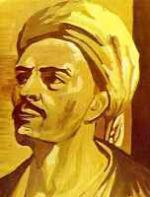The lover is outcast and idle
by Yunus EmreEnglish version by Kabir Helminski & Refik Algan
Original Language Turkish
My soul,
the way of the masters
is thinner than the thinnest.
What blocked Solomon's way was an ant.
Night and day the lover's
tears never end,
tears of blood,
remembering the Beloved.
"The lover is outcast and idle,"
they used to tell me.
It's true.
It happened to me.
I tried to make sense of the Four Books,
until love arrived,
and it all became a single syllable.
You who claim to be dervishes
and to never do what God forbids --
the only time you're free of sin
is when you're in His hands.
Two people were talking.
One said, "I wish I could see this Yunus."
"I've seen him," the other says,
"He's just another old lover."
| -- from The Longing in Between: Sacred Poetry from Around the World (A Poetry Chaikhana Anthology), Edited by Ivan M. Granger |
<<Previous Poem | More Poems by Yunus Emre | Next Poem >>

/ Image by serhatdemiroglu /
I've missed the poetry of Yunus Emre. It's been too long since our last dervish excursion with Yunus...
My soul,
the way of the masters
is thinner than the thinnest.
What blocked Solomon's way was an ant.
Statements like this -- "thinner than the thinnest," "the way is narrow," etc. -- make it sound like the only way to real insight requires extremes that few are willing or capable to go to. We assume that every action, every thought, every impulse must be strictly regulated and controlled in order to pass the test and get our dervish diploma.
But that's not it. It's not that the intent seeker must live his or her life as a sort of psychic anorexic, harshly starving away every detail of life. No, the "thinness" of this road is a way of saying that our own sense of self and self-importance must be thinned. The successful mystic must be supremely humble, which can be as easy or as difficult as we choose to make it. Acquiring the necessary humility a healing exhalation, a loving embrace of all beyond our boundaries, or it can be a painful enforced humiliation -- our choice.
But supreme humility, that's the key. The inflated self cannot fit through this thinnest way.
Night and day the lover's
tears never end,
tears of blood,
remembering the Beloved.
Tears, blood, pain... Sounds enticing, right? But don't reflexively turn away from this idea too quickly. Here's how I understand this sort of passionate statement: We, all of us, already feel this pain, all the time, we have just trained ourselves to ignore it. This is the fundamental pain of separation and isolation. As long as we imagine that we are separate from the people we love, the life we desire, the world we hope for, and, of course, God or some ultimate sense of Reality, as long as we imagine ourselves separated from these things, we feel pain. That pain is the universal human existential experience. Every relationship, all of society is built on this pain and how we deal with it.
Mystics, being crazy folks, embrace this pain, rather than run from it. To do so is an act of courage and self-honesty. It is a determination to encounter reality as it is, rather than the comfortable fantasy we want to project. Doing this also develops compassion and empathy for the secret struggles of others.
Perhaps most importantly, though, actively embracing the pain of separation opens hard-to-find pathways along the spiritual journey. Surprisingly, the pain itself becomes the doorway to reunion. By allowing oneself to become completely vulnerable to that pain, to surrender to it, the mystic finds the pain transformed into the blissful touch of the Beloved.
In other words, the ache of separation, viewed with a steady gaze, reveals itself to be a bridge of connection. It doesn't seem logical from a distance, but it's true: Yearning is union. So embrace those tears, but with purpose and confidence, and you'll find an immense smile awaiting you beneath them.
"The lover is outcast and idle,"
they used to tell me.
It's true.
It happened to me.
"Outcast and idle." I like this phase on a few levels. The lover, the seeker, the mystic... why are they outcast? As I mentioned above, they view the world different, with commitment and honesty, a determination to see things as they actually are. That makes just about everyone else uncomfortable. The normal state is self-protection and hiding. It's not really that everyone has something to hide, we just reflexively hide anyway. We want so much to be our masks, that the steady gaze of someone determined to see honestly frightens us, and we push them away. They become outcasts.
This doesn't mean that the path of the mystic is necessarily one of isolation or lack of connection. It just means that you connect in a different way, hopefully in a way that is ultimately healing for those around you.
The word "idle" here is especially interesting to me. Idle can imply lazy, which the lover is not, or inactive, which might apply in the sense that the lover becomes free from self-will. Action flows through the lover, but doesn't originate with the lover. Or we can say that the lover is idle in the sense of being still, at peace. The lover may or may not be active in the world, but there is a radiating quiet within her and her actions. Idle.
I tried to make sense of the Four Books,
until love arrived,
and it all became a single syllable.
These lines are wonderful.
We can study religious law and tradition, impress those around us with how well we've memorized it all, how closely with follow the letter of the law -- but what does it really mean? Not much, until divine love bursts from our chest. And then... well, the irony is that we don't need all those words any more. Everything is then resolved into a single word.
You who claim to be dervishes
and to never do what God forbids --
the only time you're free of sin
is when you're in His hands.
Ah, those troublesome mystics. They keep telling us that it's not about rigidly following the rules. The rules don't exist to be followed; they exist to point out a destination. The rulekeepers hate to hear the real truth: The rules, when the work, exist only to help us to yield into the embrace of the Beloved. That's the only measure that counts.
Two people were talking.
One said, "I wish I could see this Yunus."
"I've seen him," the other says,
"He's just another old lover."
Have a beautiful day, all you old lovers.

